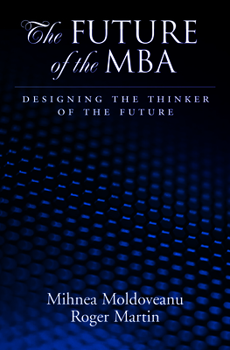Future of the MBA: Designing the Thinker of the Future
Select Format
Select Condition 
Book Overview
The MBA is probably the hottest ticket among the current university graduate degree offerings--every year, more than 120,000 students enroll in MBA programs in the United States, and the estimates in Europe do not lag far behind. In addition, job prospects have never looked better for business school graduates; corporations are hiring more business school graduates every year, and compensating them more handsomely.
The Future of the MBA provides...
Format:Hardcover
Language:English
ISBN:0195340140
ISBN13:9780195340143
Release Date:April 2008
Publisher:Oxford University Press, USA
Length:158 Pages
Weight:0.10 lbs.
Dimensions:0.6" x 6.1" x 9.3"
Customer Reviews
2 ratings
Be Careful Hiring an MBA
Published by Thriftbooks.com User , 15 years ago
If you think MBA's are the people best equipped to solve our problems in today's culture and business, you should read this book. It will make you think and question the value of MBA's. Incredible insights into those who will be valued in business and other occupations of the future. A must read. Extremely relevant.
How to prepare integrative thinkers to deliver high-value performance
Published by Thriftbooks.com User , 16 years ago
In a recent interview of Roger Martin, I asked him about the title of this book, co-authored with Mihnea C. Moldoveanu. "We envision a world in which there will be a greater focus in business education on developing the thinking styles and capacities of MBAs rather than filling their heads with analytical tools. We see teaching them to think and act responsibly and responsively in the face of multiple, incommensurable and possibly conflicting models of oneself, the world and others. This in turn requires development of their thinking capacity along three dimensions. First is nimble-mindedness, which we see as the ability to understand apparently conflicting models, walk around them and internalize rather than reject the tensions among them. Second is big-mindedness, which we see as the ability to contain and behold the conflicting models while, in the words of F. Scott Fitzgerald, "retaining the ability to function." Third is tough-mindedness, which we see as the capacity to utilize the tension among the existing models to forge a new model. This in turn requires the rigorous testing and discarding of potential solutions rather than fixating on the first one and hoping it is sound." In this volume, Moldoveanu and Martin respond to several critiques of the MBA as a program during discussions of "The Future of the MBA" during a conference co-hosted by the co-authors at the Rotman School of Management in 2006. They assert that many of the critiques do not recognize the selection value of the MBA. For example, the failure to appreciate the value of the selection value of the MBA. That is, "its value as a selection mechanism or filter that picks out individuals with high potential for management positions based on relatively powerful predictors of performance, such as general intelligence and conscientiousness." They insist that, on the contrary, it does have "a significant, demonstrable, and robust value to prospective employers." They share their vision of the high-value decision maker of the future whom they call an "integrator," one who solves a problem through effective action what the narrow specialist can often not solve even in theory. Having shared their profile of the integrator, Moldoveanu and Martin argue that the selection metric of MBA programs be expanded and refined to include "measures of openness in combination with an executive function that allows the integrator to manage his or her affective and cognitive processes." That is, to develop what the authors refer to as an "opposable" mind that, as Martin suggests in his response to the interview question, is "nimble," "big," and "tough." Especially in today's business world, executives must be able to function effectively, under control, despite what Moldoveanu and Martin describe as "an inherent and inherently irresolvable state of practical ambiguity." The tools they require include generative reasoning capacity, assertive inquiry, and causal modeling. They then pose this rhet




